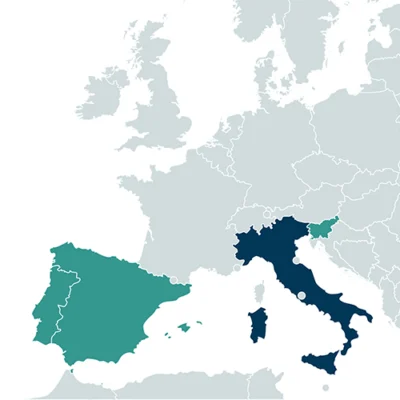Promoting soil quality and biodiversity in vineyard ecosystems through nature-based solutions
Call
Duration
01/01/2025 – 31/12/2027
Total grant
Approx. 750 thsd. €
More information
Matteo Gatti, matteo.gatti@unicatt.it
Partners of the project
- Department of Sustainable Crop Production, Sacred Heart Catholic University, Piacenza, Italy
- Department of Earth and Environmental Sciences, University of Pavia, Pavia, Italy
- Institute for Multidisciplinary Research in Applied Biology, Public University of Navarra, Pamplona, Spain
- GreenUPorto – Sustainable Agrifood Research Centre, University of Porto, Faculty of Sciences, Porto, Portugal
- Department of Agronomy, University of Ljubljana, Ljubljana, Slovenia

Context
Viticulture covers about 7.3 million hectares worldwide, with vineyards being an important crop in several EU countries. Modern viticulture is severely stressed by climate change (CC) and by several anthropogenic drivers of biodiversity loss negatively impacting at multiple scales on vineyard ecosystems, living communities, and economic performances of local wine industries.
Vineyard floor management has proven to promote either adaptation and mitigation of CC and even though mechanical and chemical weeding has been considered for a long time as the most powerful solution, novel NbS, fostering transformative change and better adaptation to the current climatic scenarios, are nowadays urged.
Vineyards are good candidates for improved soil health, conservation and the increase of biodiversity. However, little information is available on the relationship between soil biodiversity and its functions in vineyard ecosystems. Following an integrated approach, SOILDIVINE will assess if and how NbS-driven vineyard soil management contributes to soil health and biodiversity benefits and will explore its contribution to societal challenges and transformative change from selected local territories up to larger scale.
Main objectives
SOILDIVINE aims to:
- Understand the effectiveness of NbS adopted in the within- and between-row space to promote soil fertility and health, and vineyard biodiversity of above and below-ground organisms;
- Evaluate the impacts and the effectiveness of NbS in the inter-row space under different climates to regulate vine balance, maintain yield and improve grape composition;
- Understand if and how novel NbS can be adopted in the under-the-row strip towards increased sustainability and drought resilience of EU wine districts;
- Identify the best compromise between NbS and sustainable and cost-effective vineyard management;
- The project will also assess ecosystem services fostered by NbS and will provide NbS centred recommendations to policy makers for developing forthcoming rural policies.
Main activities
Actions, tools, methods and approaches implemented in SOILDIVINE are almost new within the geographical context of the project encompassing Italy, Portugal, Slovenia and Spain. NbS will be compared to traditional solutions in demo vineyards that will be primarily identified to ensure continuity with already concluded programs (i.e. Life and Operational Groups) as well as to establish connections with Living Labs. NbS established in the within- and between-row space will be compared to standard practices to improve biodiversity, soil quality and drought resilience of Mediterranean vineyards. NbS impacts on grapevine performances will be assessed over the project duration.
In parallel, the NbS effects on soil properties will be measured by considering physical, chemical, biological and ecotoxicological descriptors, while a multidisciplinary assessment of vineyard biodiversity will encompass microorganisms, macro and micro fauna, above and below ground grapevine pest and beneficials, floristic composition of artificial and resident grasses.
SOILDIVINE is a transnational project putting together several academic institutions to advance multidisciplinary research on NbS. The project aims are also shared by the Foundation for Rural Development in Oltrepò Pavese (Lombardia, Italy) that is available to develop better policies based upon rigorous scientific knowledge. A participatory approach to the problems will be adopted involving scientists, private and public stakeholders within and beyond the SOILDIVINE study areas. Results will be adapted to other countries and their feasibility assessed on a regional and EU level.